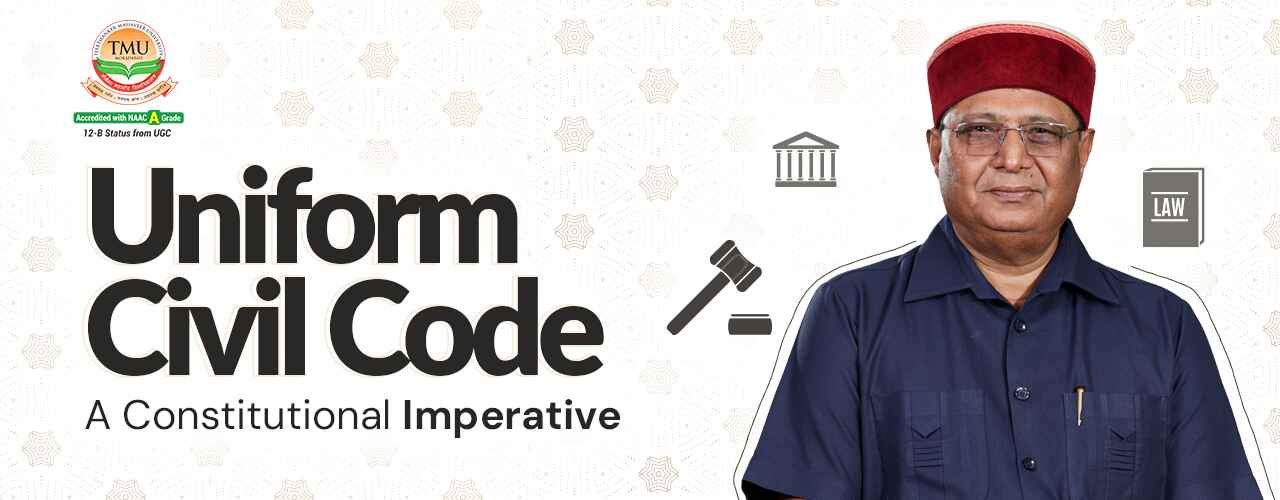Uniform Civil Code: A Constitutional Imperative for Unity and Justice
Table of Contents
By Prof. (Dr.) Harbansh Dixit
Introduction
The Hon'ble Court has recently urged the Government to take steps toward ensuring uniform civil rights for all Indian citizens. The Delhi High Court termed this as a crucial requirement of the current time, necessary for creating a more inclusive and aware society, and to foster unity and progress among all communities.
Article 44 of the Constitution of India is one of the most misunderstood and misrepresented provisions. Despite being a part of the Directive Principles of State Policy, it has often been surrounded by controversy and political reluctance. The article mandates the State to strive towards securing a Uniform Civil Code (UCC) for all citizens, irrespective of religion, region, language, or cultural background.
Teerthanker Mahaveer University
Apply for Admission
Click Here To Apply for Admission
Misconceptions and Misuse
Unfortunately, any attempt to discuss or implement Article 44 has been quickly politicised and communalised. What should be a logical, secular move toward national integration has repeatedly been presented as a religious imposition. Consequently, judicial appeals to initiate a dialogue on UCC have been ignored under the pretext of communal sensitivity.
Our democratic ethos demands that we overcome these unfounded fears and engage in rational discourse. Instead, we often suppress such discussions, fearing backlash or electoral consequences.
Secularism and Justice, Not Religion
The framers of the Indian Constitution were clear that issues like marriage, maintenance, and adoption should be governed by principles of justice and equality, not by religious doctrines. For instance, if a person adopts a child to extend their familial legacy and this act grants them a sense of security, how does this disrespect any particular religious practice?
Similarly, if a divorced woman receives maintenance for her sustenance and dignity, it should not be seen as a violation of religious rights but as a step toward ensuring social justice and gender equality. Legal reforms in Hindu law post-independence are prime examples—polygamy was prohibited, divorce rights were recognised, and women were granted rights in inheritance and adoption.
These changes reflect a shift from traditional customs to principles of human rights and constitutional equality. However, such progress remains largely confined to the Hindu community due to selective political priorities.
Judicial Interventions and Missed Opportunities
Courts have consistently advocated for broader civil reforms. The landmark Shah Bano case (1985) is a testament to this. The Supreme Court observed that despite Article 44 being part of the Constitution, the government had taken no meaningful action. The court stressed that the community in question needed to come forward so as not to be left behind in the march of progress.
Ironically, the same judgment that sought progress and inclusivity was later used to deepen communal divisions. Subsequent cases like Sarla Mudgal (1995) and Lily Thomas (2000) highlighted the misuse of personal laws for dishonest gains, such as changing religion solely to remarry and circumvent existing legal obligations.
These judicial verdicts strongly recommended the immediate implementation of a Uniform Civil Code to curb exploitation and to protect vulnerable sections of society. Unfortunately, despite such clarity from the judiciary, political leadership has remained unmoved, trapped in the legacy of the Shah Bano backlash.
Scholarly Support and Constitutional Mandate
Prominent Muslim scholars have also endorsed the idea of UCC. Justice Mohammed Karim Chagla advocated for it in his lectures. Prof. Tahir Mahmood supported it in his book Muslim Personal Law Reform (1977), and Justice A.M. Mulla echoed similar sentiments in Impact of Secularism (1973).
Yet, even decades after the Shah Bano verdict, no significant legislative step has been taken. It's high time that we rise above narrow political interests and recognise the larger societal good.
Conclusion
Article 44 and various judicial directives indicate the constitutional vision of a unified civil framework that ensures dignity, security, and equality for all. It is essential that the modern, inclusive thinking seen in Hindu law reforms extends to all communities.
The judiciary has been making sincere efforts in this direction. Now, it is upon the legislature and the citizenry to initiate action, so that we may evolve into a progressive society united in spirit and law.
This content gives an overview of the programme and is for educational purposes only. For updated admission guidelines and counselling support, please connect with our Counsellor Team.














